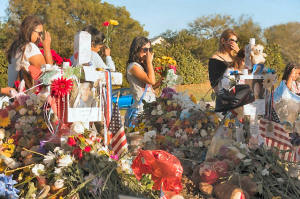|
Arming Florida school staff could expose
them to suits: experts
 Send a link to a friend
Send a link to a friend
 [March 09, 2018]
By Tina Bellon [March 09, 2018]
By Tina Bellon
(Reuters) - A bill passed by Florida
lawmakers empowering some personnel in public schools to carry firearms
to guard against attacks like last month's massacre near Miami could
expose these employees to potentially costly civil lawsuits, legal
experts said.
Public employees are generally immune to civil suits, but those
authorized to carry a concealed weapon under the Florida measure
potentially could be held liable in circumstances such as an accidental
shooting or if a gun is lost or stolen and later used in a crime, the
experts said.
The measure was passed by Florida's Republican-controlled legislature on
Wednesday and will become law in two weeks unless Republican Governor
Rick Scott vetoes it. It was approved in the aftermath of the Feb. 14
mass shooting at Marjory Stoneman Douglas High School in Parkland in
which 17 students and staff were killed.
The legislation would create a program that would allow librarians,
coaches and some other school staff to carry a concealed weapon and act
as "deputy sheriffs" in the event of an active shooting incident. It
would exclude classroom teachers from carrying guns to work unless they
are part of the Junior Reserve Officers' Training Corps, U.S. military
service members or former police officers.

While public employees in general are immune from civil suits, they can
be held liable under Florida law if they act with "wanton and willful
disregard of human rights, safety or property."
"The Florida test does set the bar very high, but it is not an airtight
protection," said University of Virginia law professor Kenneth Abraham,
who specializes in legal risk and insurance.
Under the measure, program participants must undergo mental health and
drug screenings and complete a 132-hour training before being authorized
as deputy sheriffs. They can act only "to prevent and abate" an active
shooter on a school campus.
The Florida Education Association, the union representing teachers and
other school staff in the state, generally opposes the legislation.
Union spokeswoman Sharon Nesvig criticized lawmakers for failing to
provide guidance on liability issues.
Insurance policies carried by the union and the Florida Department of
Education do not cover incidents involving firearms, added Ronald Meyer,
a lawyer for the union.
'NOT DOING SOMETHING'
New York University law professor Mark Geistfeld said Florida's
protections against lawsuits for state employees are strong and
educators likely could be held liable in a civil case only if they acted
criminally.
"Worries about liability exposure are often invoked as a reason for not
doing something that one would like to avoid for other reasons,"
Geistfeld said.
Legal experts said they did not know of a case in which a school
employee had been sued for injuring a student with a gun. But several
scenarios could give rise to lawsuits, they said.
[to top of second column]
|

Well-wishers place mementos the day students and parents arrive for
voluntary campus orientation at the Marjory Stoneman Douglas High
School, for the coming Wednesday's reopening, following last week's
mass shooting in Parkland, Florida,February 25, 2018. REUTERS/Angel
Valentin

The biggest liability risk would be if a gun were stolen or lost and
then later used in a shooting, said Stanford Law School professor
John Donohue, an expert on gun ownership legal issues.
School employees would likely not face liability if the gun were
adequately locked away and a student broke in and took it, experts
said.
Law professor Ken Simons of the University of California, Irvine
said school staff could be sued for their actions defending against
a shooter if poor aim or a ricochet accidentally wounds or kills an
innocent student.
Such suits sometimes are brought when police officers injure
bystanders. When police fired more than 100 bullets in 2011 to stop
a potential attacker in Miami Beach, several bystanders were
severely wounded. Civil litigation against officers and the police
department dragged on for nearly two years before settling.
Robert Switkes, a Florida attorney who represented some of the
officers in that litigation, said the Miami Beach bystanders had a
strong case.
"Unless you give librarians the same training as police officers,
you're subjecting them to immense liability," Switkes said.
John Berry, a lawyer who defends police officers, said if a school
employee shot a student carrying a toy gun, mistaking it for a real
weapon, a plaintiff might have a strong case.
Even if an educator were sued, experts said the case could
ultimately be dismissed by a judge or a jury given the difficulty of
proving someone acted with "wanton disregard." But the mere prospect
of defending against a lawsuit could be daunting.

"Even if you win at the end, this is not something you'd want to go
through as an educator," the University of Virginia's Abraham said.
(Reporting by Tina Bellon; Editing by Noeleen Walder and Will
Dunham)
[© 2018 Thomson Reuters. All rights
reserved.]
Copyright 2018 Reuters. All rights reserved. This material may not be published,
broadcast, rewritten or redistributed.
Thompson Reuters is solely responsible for this content. |